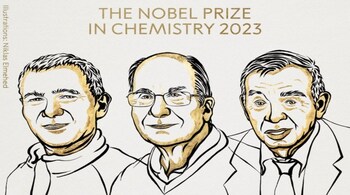The Royal Swedish Academy of Sciences has decided to award the 2023 Nobel Prize in Chemistry to Moungi Bawendi, Louis Brus and Alexei Ekimov, according to an official release issued on October 4.
The award has been issued to them "for the discovery and development of quantum dots”, the release said.
The Royal Swedish Academy of Sciences has stated that their pioneering contributions can help surgeons in precise tumour tissue removal, among a multitude of other uses. These smallest components of nanotechnology also currently illuminate screens in televisions and LED lamps, it noted.
"The Nobel Laureates in Chemistry 2023 have succeeded in producing particles so small that their properties are determined by quantum phenomena. The particles, which are called quantum dots are now of great importance in nanotechnology," the prize-awarding academy said.
Independently of each other, Ekimov and Brus succeeded in creating quantum dots, and Bawendi revolutionised the chemical production, the Academy said.
“Quantum dots have many fascinating and unusual properties. Importantly, they have different colours depending on their size,” says Johan Åqvist, Chair of the Nobel Committee for Chemistry.
"Quantum dots are thus bringing the greatest benefit to humankind. Researchers believe that in the future they could contribute to flexible electronics, tiny sensors, thinner solar cells and encrypted quantum communication – so we have just started exploring the potential of these tiny particles," the academy said.
Here is a synopsis of their life and accomplishments:
Moungi Bawendi
Moungi G Bawendi, born in Paris, France, in 1961, completed his PhD in 1988 at the University of Chicago in Illinois, USA. He currently serves as a Professor at the Massachusetts Institute of Technology (MIT) in Cambridge, USA.
In 1993, Moungi Bawendi revolutionised the chemical production of quantum dots, resulting in almost perfect particles. This high quality was necessary for them to be utilised in applications.
Louis Brus
Louis E Brus, born in Cleveland, Ohio, USA, in 1943, earned his PhD in 1969 from Columbia University in New York, USA. He is currently a professor at Columbia University in New York.
Louis Brus was the first scientist in the world to prove size-dependent quantum effects in particles floating freely in a fluid.
Also Read: Nobel Prize 2023 in physics: A look at the winners
Alexei Ekimov
Alexei I Ekimov, born in the former USSR in 1945, obtained his PhD in 1974 from the Ioffe Physical-Technical Institute in Saint Petersburg, Russia. He previously held the position of Chief Scientist at Nanocrystals Technology Inc. in New York, USA.
In the early 1980s, Alexei Ekimov succeeded in creating size-dependent quantum effects in coloured glass. The colour came from nanoparticles of copper chloride and Ekimov demonstrated that the particle size affected the colour of the glass via quantum effects.
The laureates will be invited to receive their awards at ceremony on December 10, the anniversary of Alfred Nobel's death.
Discover the latest Business News, Sensex, and Nifty updates. Obtain Personal Finance insights, tax queries, and expert opinions on Moneycontrol or download the Moneycontrol App to stay updated!









